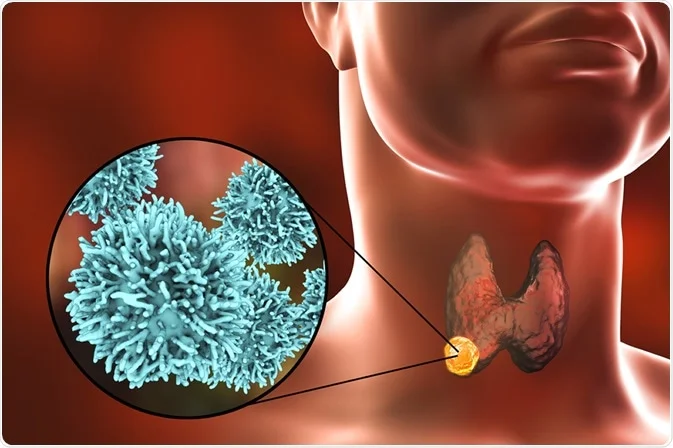It has been estimated that about 42 million people in India suffer from thyroid diseases
The thyroid gland is positioned at the front of the neck, frequently develops nodules, particularly with advancing age. While most nodules remain asymptomatic and undetected, it is crucial to assess them when identified to rule out malignancy. Fortunately, the vast majority of thyroid nodules are benign in nature.
Thyroid Disorder can be either due to swelling or nodules in the gland or due to abnormally low (Hypothyroidism) or high (Hyperthyroidism) thyroid hormone levels.

Hypothyroidism occurs when the thyroid gland fails to produce sufficient hormones, leading to a slowdown in the body’s metabolic processes. Hypothyroidism, or underactive thyroid, is more common in women and people over age 50. This condition is most commonly caused by autoimmune disorders such as Hashimoto’s thyroiditis. We focus on accurate diagnosis using blood tests to measure thyroid hormone levels. Treatment typically involves thyroid hormone replacement therapy, which helps restore normal metabolic function and alleviates symptoms.
Hypothyroidism during pregnancy occurs when the thyroid gland does not produce enough thyroid hormones. These hormones play a vital role in regulating metabolism and supporting fetal development, especially in the early stages when the baby relies entirely on the mother’s thyroid hormones. Left untreated, hypothyroidism can affect both the mother and the baby, making timely diagnosis and treatment essential.










If hypothyroidism is caused by an underlying condition such as Hashimoto’s thyroiditis, treatment is focused on hormone replacement. However, in rare cases of hypothyroidism due to medications or pituitary gland issues, treating the underlying cause can be part of the management plan.
While thyroid hormone replacement is the main treatment, maintaining a balanced diet and healthy lifestyle can help manage symptoms. Certain foods like soy, high-fiber foods, and supplements containing iron or calcium should be taken with caution, as they can interfere with levothyroxine absorption.
Hyperthyroidism is a condition in which the thyroid gland makes too much thyroid hormone. The condition is often referred to as an “overactive thyroid.”
The thyroid gland is an important organ of the endocrine system. It is located in the front of the neck just below the voice box. The gland produces the hormones thyroxine (T4) and triiodothyronine (T3), which control the way every cell in the body uses energy. This process is called metabolism. Hyperthyroidism occurs when the thyroid releases too much of its hormones over a short (acute) or long (chronic) period of time.
However, Hyperthyroidism during pregnancy is a condition in which the thyroid gland produces excessive thyroid hormones. These hormones regulate metabolism, and their overproduction can affect both maternal and fetal health. Proper diagnosis and management are critical to ensure a healthy pregnancy and reduce risks for both the mother and baby.










Medications such as Methimazole or Propylthiouracil (PTU) are used to reduce thyroid hormone production by the thyroid gland. This treatment are typically long-term, sometimes for a year or more, to achieve remission.
Radioactive Iodine (RAI) is a common and effective treatment that works by destroying overactive thyroid cells. The patient takes a pill containing radioactive iodine, which is absorbed by the thyroid. Over time, this reduces the production of thyroid hormones. RAI is often a permanent solution, though it may lead to hypothyroidism, requiring lifelong thyroid hormone replacement therapy.
In cases where medications or radioactive iodine therapy are not appropriate, or if there is a large goiter or thyroid cancer, surgical removal of part or all of the thyroid gland may be recommended. After surgery, most patients will require thyroid hormone replacement for life.
After successful radioactive iodine therapy or surgery, most patients will require levothyroxine, a synthetic thyroid hormone replacement, to maintain normal thyroid function if hypothyroidism develops.
Managing diet and stress levels can help control symptoms. Limiting foods high in iodine (such as seaweed and certain seafood) can reduce the thyroid’s activity. Stress-reducing practices like yoga and meditation may also help manage anxiety and restlessness associated with hyperthyroidism.
These do not treat hyperthyroidism directly but help manage symptoms like rapid heart rate, tremors, and anxiety by blocking the effects of thyroid hormones on the body.
A thyroid nodule is a lump or growth within the thyroid gland, which is located at the base of the neck. While most nodules are benign, a small percentage can be cancerous. Patients may not always notice symptoms, but when nodules grow, they can cause discomfort, difficulty swallowing, or a visible lump in the neck. We conduct thorough evaluations using imaging techniques such as ultrasound and fine-needle aspiration (FNA) biopsies to determine the nature of the nodule and develop an appropriate treatment plan.





Thyroid cancer is a serious condition that often presents as a lump in the thyroid gland. Although it is one of the more treatable cancers, early detection is crucial. Dr. Aditya’s Endocrine Clinic provides comprehensive care, including diagnostic testing such as imaging and biopsy, followed by treatment options like surgery, radioactive iodine therapy, and hormone therapy to manage thyroid cancer. Our clinic emphasizes a multidisciplinary approach, ensuring that every patient receives the best treatment that maximizes outcomes and quality of life.

WhatsApp us
